Horace Bushnell Collection (20 vols.)
Digital Logos Edition
This product has been transferred from Community Pricing to Pre-Pub. The actual funding level may be lower than it appears, which could delay production. The amount of funding still needed will be evaluated and updated soon.
Overview
Take a close look into the writings of the man who brought Schleiermacher’s Protestant liberalism to North America. For the first time, Horace Bushnell’s works appear in one 20 volume collection. In addition to the works authored by Bushnell, this collection also includes an early biography with Bushnell’s collected letters as well as volumes on Bushnell’s work as a preacher and educator written by his wife, Mary Bushnell Cheney, and by contemporaries Theodore T. Munger and Henry C. Trumbull. With this comprehensive collection, you’ll study firsthand the work and personal writings of this significant figure in American Protestantism who influenced the direction of twentieth century Protestant theology.
In addition to his rejection of the standard Calvinism of his time, Bushnell’s views on the trinity and atonement are particularly important for the development of Protestant liberal theology in America. He challenged the classic articulation of the Trinity and argued that God did not necessarily exist in three distinct persons from all eternity. In his two-volume work The Vicarious Sacrifice, Bushnell challenged the necessity of a penal, substitutionary atonement and instead argued that Christ’s earthly ministry and crucifixion merely provided an example of self-sacrificial love, a form of the moral influence theory of the atonement.
With the Logos Bible Software edition, you will be able to easily and thoroughly research this valuable resource more quickly than ever before. All Scripture passages in the Horace Bushnell Collection are tagged to appear on mouseover and the entire collection is fully searchable and integrated into the Logos research system to save you hours of time. Instantly find each place Bushnell deals with specific biblical passages and topics for the most efficient research.
Key Features
- An in-depth look into the theology and influence of the father of Protestant Liberalism in America
- Bushnell’s personal letters as well as biographical accounts from his family and close friends
Praise for Horace Bushnell
Bushnell’s influence hastened the acceptance in America of Friedrich Schleiermacher, Coleridge, and their romantic picture of the world . . . Bushnell offered a theological perspective, which, while not itself completely divorced from traditional Protestantism, helped clear the way for a thorough liberalization of the faith.
—Evangelical Dictionary of Theology
Bushnell’s understanding of language, the organicism of his theology, and his evolutionary and developmental conception of faith made a powerful impact on the Christian education movement, the social gospel, and Protestant modernism.
—Encyclopedia of the Reformed Faith
The preaching of most men is fashioned by the theology of the day; Bushnell’s preaching helped fashion the theology of his day. He was not a systematic theologian, but he influenced theology; he was not a philosopher, but his writings deeply affected the philosophy of Christian education. Referred to by some as the ‘Beloved Heretic,’ Bushnell will long continue to make his mark upon American church life.
—A Treasury of Great Preaching: An Encyclopedia of Preaching
As an orator Bushnell ranked high among his contemporaries . . . His similes and metaphors are masterful.
—The Reading and Preaching of the Scriptures in the Worship of the Christian Church
Product Details
- Title: Horace Bushnell Collection
- Authors: Horace Bushnell, Mary Bushnell Cheney, Theodore T. Munger, Henry Clay Trumble
- Volumes: 20
- Pages: 7,272
Individual Titles
- Christian Nurture by Horace Bushnell
- Nature and the Supernatural by Horace Bushnell
- The Vicarious Sacrifice, vol. 1, by Horace Bushnell
- The Vicarious Sacrifice, vol. 2, by Horace Bushnell
- God in Christ by Horace Bushnell
- Christ in Theology by Horace Bushnell
- The Character of Jesus: Forbidding His Possible Classification with Men by Horace Bushnell
- Sermons for the New Life by Horace Bushnell
- Sermons on Christ and His Salvation by Horace Bushnell
- Sermons on Living Subjects by Horace Bushnell
- A Discourse on the Slavery Question by Horace Bushnell
- The Spirit in Man: Sermons and Selections by Horace Bushnell
- Work and Play by Horace Bushnell
- Moral Uses of Dark Things by Horace Bushnell
- Women’s Suffrage: The Reform against Nature by Horace Bushnell
- Building Eras in Religion by Horace Bushnell
- Forgiveness and Law by Horace Bushnell
- Life and Letters of Horace Bushnell by Mary Bushnell Cheney
- Horace Bushnell: Preacher and Theologian by Theodore T. Munger
- My Four Religious Teachers by Henry Clay Trumbull
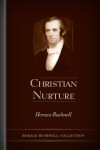
As a response to the parental concerns of his congregants, Bushnell wrote Christian Nurture to emphasize the centrality of the family in raising children and youth in the Christian faith. He highlighted long-term education and emphasized that “the child is to grow up a Christian, and never know himself as being otherwise.”
Through his dynamic, holistic view of the Christian life, Bushnell became ‘the patron saint’ of much of American religious education.
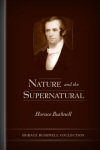
Many Protestant scholars in this era sought to rescue Christianity from modernism by explaining away the miracles in Scripture. Ironically, though being the father of American Protestant Liberalism, Bushnell argues in this work for the reality of miracles for the “authentication of the gospel history.” In this very meticulous work, Bushnell begins by raising the questions surrounding the issue of the supernatural in an increasingly naturalistic society. He goes on to carefully define the natural and supernatural and argues that all humans seek the supernatural, even the atheists who insist otherwise. Bushnell also includes a discussion of the problem of evil. In anti-Calvinistic fashion, he argues that the possibility of evil is necessary for creaturely liberty. The rest of the work builds on this by arguing that the fact of evil in the world requires the supernatural if humanity is to have any hope of progress. He goes on to discuss the person and work of Jesus who is proof of the supernatural. Before the conclusion, he also includes a discussion of miracles and spiritual gifts in which he seeks to trace their continuation from the close of the canon, through church history, and into the present time.
. . . written by that prince of American theologians, Horace Bushnell. It formed an epoch in the lives of many young men, and became a shaping force in their subsequent thinking.
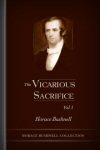
Bushnell’s two-volume The Vicarious Sacrifice is essential for a thorough understanding of the rise of Protestant Liberalism in America. Various views of the atonement were at the forefront of the debate between those who stood for classical orthodoxy, like the Old Princeton theologians, and those who were advancing Protestant Liberalism, like Bushnell. Bushnell experienced firsthand the tragic suffering of the Civil War. This was a significant factor leading to his view that Christ’s death was primarily an example of selfless love for humanity to follow—the moral influence theory of the atonement. This challenged the necessity of a penal, substitutionary atonement. Bushnell discusses Scripture and historical theology extensively in this important work. In volume one, Bushnell discusses the meaning of vicarious sacrifice and how it relates to the Trinity, angels, and men. He then discusses the way in which he considers Christ’s sacrifice to be saving and renovating.
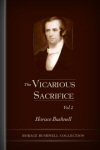
Bushnell’s two-volume The Vicarious Sacrifice is essential for a thorough understanding of the rise of Protestant Liberalism in America. Various views of the atonement were at the forefront of the debate between those who stood for classical orthodoxy, like the Old Princeton theologians, and those who were advancing Protestant Liberalism, like Bushnell. Bushnell experienced firsthand the tragic suffering of the Civil War. This was a significant factor leading to his view that Christ’s death was primarily an example of selfless love for humanity to follow—the moral influence theory of the atonement. This challenged the necessity of a penal, substitutionary atonement. Bushnell discusses Scripture and historical theology extensively in this important work. In volume two, Bushnell presented his theory of forgiveness and propitiation apart from expiation and sought to justify the need for revising this doctrine.
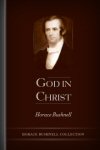
This volume is a collection of three discourses and a dissertation on language. The dissertation on language is considered his most important work; in it, he argues that, because language is approximate, humans cannot apprehend God with the intellect but can only embrace him with the heart. Because language is socio-cultural, he argues, it does not have the precision required by dogmatic theology.
These writings led to charges against Bushnell for heresy in denying the classical doctrine of the Trinity as simply an instrument used to communicate the nature of God to our finite minds. In addition to the subjects of language and the Trinity, Bushnell also discusses the atonement and the relationship between dogma and piety.
. . . a revolutionary, metaphorical theory of language, foreshadowing developments in late twentieth-century theology.
—The Dictionary of Historical Theology
Bushnell was perhaps the most important precursor of the religious liberals who followed later in the century. In Christian Nurture (1847), God in Christ (1849) and other works, he developed many of the themes that came to dominate modernism: the immanence of God, the importance of Christian experience, the necessity of doctrinal revision and the poetic nature of religious language.
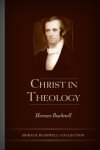
Bushnell wrote this volume in response to the charges of heresy leveled against him because of the previous volume, God in Christ. In this work, Bushnell sought to amplify and defend his contention that language, because it is only approximate, is inadequate to support the demands of precision required by a dogmatic theology. This volume goes on to defend his view of the person and work of Christ, as well as his view of the Trinity. After writing this work, Bushnell was never formally convicted of heresy, though he did not retract his views.
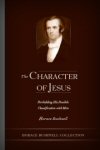
This work is an expansion of chapter 10 in Nature and the Supernatural which received such popular interest that Bushnell was asked to make it a volume of its own. In this short but influential work, Bushnell examined the character and work of Jesus and presented a plethora of unique features that set Christ apart from finite human beings. Bushnell’s contention is that the rational person is not able to classify Jesus as a mere man. Rather, Christ must be the divine God-man.
. . . one of the noblest tributes of genius to the superhuman perfection of our Saviour, and superior to Channing’s admirable essay on the same subject.
—Theological Propædeutic: A General Introduction to the Study of Theology
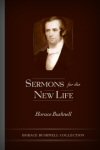
This volume contains 23 of Bushnell’s sermons on various texts and topics having to do with the Christian life and faith. With this volume you will be able to study the sermons of one of the best orators of the later nineteenth century. Search these texts for specific topics and exegesis of particular passages and see how the doctrine of this important theologian affected and interacted with his preaching.
This volume contains sermons on the following topics and texts:
- Every Man’s Life and Plan of God: Isaiah 9:5
- The Spirit in Man: Job 32:8
- Dignity of Human Nature Shown from Its Ruins: Romans 3:13–18
- The Hunger of the Soul: Luke 15:17
- The Reason of Faith: John 6:36
- Regeneration: John 3:8
- The Personal Love and Lead of Christ: John 10:8
- Light on the Cloud: Job 37:21
- The Capacity of Religion Extirpated by Disuse: Matthew 25:28
- Unconscious Influence: John 20:8
- Obligation and Privilege: Psalm 119:54
- Happiness and Joy: John 15:11
- The True Problem of Christian Experience: Revelation 2:4
- The Lost Purity Restored: 1 John 3:3
- Living to God in Small Things: Luke 16:10
- The Power of an Endless Life: Hebrews 7:16
- Respectable Sin: John 8:9
- The Power of God in Self Sacrifice: 1 Corinthians 1:24
- Duty Not Measured by Our Own Ability: Luke 9:13
- He That Knows God Will Confess Him: Psalm 40:10
- The Efficiency of the Passive Virtues: Revelation 1:9
- Spiritual Dislodgments: Jeremiah 48:8
- Christ as Separate from the World: Hebrews 7:26
Two of his [Horace Bushnell’s] sermons, ‘Unconscious Influence’ and ‘Every Man’s Life a Plan of God,’ are rated as two of the finest in the English language. Three volumes of his sermons are the very finest expressions of pulpit style: Sermons for the New Life, Christ and His Salvation, and Sermons on Living Subjects.
—A Treasury of Great Preaching: An Encyclopedia of Preaching
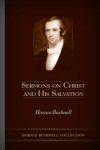
In this collection of 21 sermons, the content presented in The Vicarious Sacrifice is brought to the pulpit. Though officially retired at the time, Bushnell continued his prolific career as a writer and preacher. With this volume, you will be able to study the sermons of one of the best orators of the later nineteenth century. Search these texts for specific topics and exegesis of particular passages and see how the doctrine of this important theologian affected and interacted with his preaching.
This volume contains sermons on the following topics and texts:
- Christ Waiting to Find Room: Luke 2:7
- The Gentleness of God: Psalm 18:35
- The Insight of Love: Mark 14:8
- Salvation for the Lost Condition: Matthew 18:11
- The Fasting and Temptation of Jesus: Matthew 4:1–2
- Conviction of Sin by the Cross: John 16:9–11
- Christ Asleep: Matthew 8:24
- Christian Ability: James 3:4
- Integrity and Grace: Psalm 7:8
- Liberty and Discipline: Mark 2:19–20
- Christ’s Agony, or Moral Suffering: Luke 22:44
- The Physical Suffering, or Cross of Christ: Hebrews 2:10
- Salvation by Man: 1 Cor 15:21
- The Bad Consciousness Taken Away: Hebrews 10:2
- The Bad Mind Makes a Bad Element: John 8:48
- Present Relations of Christ with His Followers: John 14:28
- The Wrath of the Lamb: Revelation 6:16–17
- Christian Forgiveness: Ephesians 4:32
- Christ Bearing the Sins of Transgressors: Hebrews 9:20
- The Putting on of Christ: Romans 13:14
- Heaven Opened: John 1:51
The strengths of Bushnell’s preaching are many. The clearest marks of his style are dignity and depth of thought: every sermon is thought-provoking; every sermon is impressive in its stately dignity of expression.
—A Treasury of Great Preaching: An Encyclopedia of Preaching
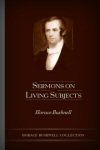
A graduate of Yale and later a tutor there, Bushnell preached several sermons in the chapel at Yale. A large number of the 22 sermons in this volume were delivered in that chapel. With this volume, you will be able to study the sermons of one of the best orators of the later nineteenth century. Search these texts for specific topics and exegesis of particular passages, and see how the doctrine of this important theologian affected and interacted with his preaching.
This volume contains sermons on the following topics and texts:
- Mary, the Mother of Jesus: Luke 1:28
- Loving God Is but Letting God Love Us: 1 John 4:16
- Feet and Wings: Ezekiel 1:24
- The Gospel of the Face: 2 Corinthians 4:6
- The Completing of the Soul: Colossians 2:10
- The Immediate Knowledge of God: 1 Corinthians 15:34
- Religious Nature and Religious Character: Acts 17:27
- The Property Right We Are to Get in Souls: 2 Corinthians 12:14
- The Dissolving of Doubts: Daniel 5:16
- Christ Regenerates Even the Desires: Mark 10:35
- A Single Trial Better than Many: Hebrews 9:27
- Self-Examination Examined: Psalm 26:2
- How to Be a Christian in Trade: Matthew 25:16
- In and by Things Temporal Are Given Things Eternal: 2 Corinthians 4:18
- God Organizing in the Church His Eternal Society: Hebrews 12:22–23
- Routine Observance Indispensable: Matthew 6:11
- Our Advantage in Being Finite: Hebrews 2:7
- The Outside Saints: Acts 10:35-34
- Free to Amusements, and Too Free to Want Them: 1 Corinthians 10:27
- The Military Discipline: 2 Timothy 2:3–4
- The Coronation of the Lamb: Rev 22:1
- Our Relations to Christ in the Future Life: 1 Corinthians 15:28
The thinking of Bushnell may have been both revolutionary and radical—especially for his day—but he exercised a profound and practical influence on the people who heard him. A contemporary of his, another minister, said that after hearing him on Sunday men would often say, ‘I’ve heard a great sermon, and I’m going to make my week mean something.’
—A Treasury of Great Preaching: An Encyclopedia of Preaching
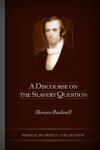
As a theologian and pastor during the time of the Civil War, Bushnell will take you into the heart of the controversy over slavery from the perspective of the church in America during that time. In this short work, Bushnell asked whether it is possible to abolish slavery and, if so, what ought the North do to bring about that end in the South? Essentially, Bushnell argued that if slave owners follow their consciences, they would abolish slavery entirely.
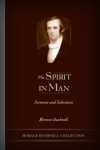
This volume contains many topical sermons by Bushnell. Some are presented in their entirety, while only selections are presented from others. This important collection also includes several personal letters written by Bushnell to his family and friends. It contains many aphorisms from several of his other works and miscellaneous sources. With this volume, you will be able to study the sermons of one of the best orators of the later nineteenth century. Search these texts for specific topics and exegesis of particular passages, and see how the doctrine of this important theologian affected and interacted with his preaching.
Above all he was a preacher, and it was as a preacher that he made his greatest contributions.
—A Treasury of Great Preaching: An Encyclopedia of Preaching
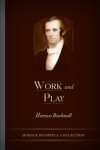
This volume contains many of Bushnell’s more popular writings on various cultural issues of the time, including slavery, the expansion of Christian schools in the West, Christian music, and many others that demonstrate the controversies of the time and Bushnell’s remarkable influence on these matters. In the first section, from which the volume gets its name, Bushnell wrote that when we truly understand freedom, all of life becomes “poetry and rhythm.” In “The Growth of Law” he addresses the relationship between slavery and the Mosaic law, which he says was permissive, not permanent. The next section, “The Founders Great in Their Unconsciousness” is considered “one of the best of many great addresses upon the Pilgrim Fathers.”
‘Work and Play,’—from a purely literary point of view, is to be regarded as his best. . . ‘For originality, simplicity, and splendor, either as spoken or on the written page, it has scarce, if ever, been surpassed in the land.’
—Horace Bushnell: Preacher and Theologian
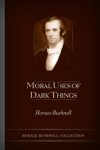
Bushnell’s purpose in this work is to “bring the ‘dark things’ of the universe and of human experience into ‘the one system of God.’” In this interesting work, Bushnell addresses a plethora of issues concerning why the world is the way it is, from night and sleep, bad government, and physical pain to climatological anomalies in California.
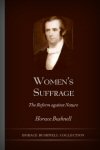
Bushnell believed that the traditional roles of male and female ought to be maintained in order to uphold “the peace and unity of domestic life.” Essentially, Bushnell argued that the natural order dictates the proper role of male and female in society. In this volume, Bushnell presents his views on these matters in the rapidly changing culture of America during that time.
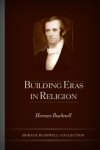
This volume is a collection of essays on various topics set aside by Bushnell during his declining health to be posthumously published. Bushnell addresses such issues as education, revivalism, government, and the training and competence of preachers; he also includes a letter to Pope Gregory XVI.
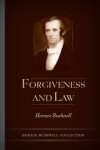
After publishing the second volume of The Vicarious Sacrifice, Bushnell revised his views on the atonement. This important work, Forgiveness and Law, represents the revision of his teaching on those subjects and provides a window into the theological development of this remarkably significant figure. The first section of this work contains Bushnell’s explanation of why he revised his views on the atonement. Bushnell continued to hold to a moral influence view of the atonement. In volume two of The Vicarious Sacrifice, Bushnell argued that the death of Christ only propitiated man, not God. In Forgiveness and Law, Bushnell now argued that Christ’s death also propitiated God, though not in a judicial sense.
It is valuable, if for nothing else, as a new testimony to the inadequacy of the ‘moral view’ of the atonement which he has so ably advocated.
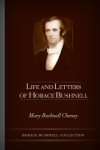
No Horace Bushnell collection would be complete without including the work of his best biographers. This extensive biography, written by Bushnell’s daughters, not only contains a rich composite of Bushnell’s life and character, but also contains autobiographical segments and a closing chapter of “family reminiscences.” Take a close look into the life of this influential man from the perspective of his closest friends and family, who contributed much of the information in this volume.
Mary Bushnell Cheney was one of Horace Bushnell’s beloved duaghters, to whom he would often write letters that showed the closest of relationships.
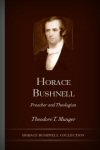
This helpful work provides the first thorough analysis of Bushnell as a theologian and preacher. Drawing on much of the biographical information in Life and Letters of Horace Bushnell, Munger not only presents the thought of Bushnell but also traces the pastoral and theological development of Bushnell through the experiences and contexts that shaped his thought.
Theodore T. Munger held the degree of Doctor of Divinity and was an expert on Horace Bushnell.
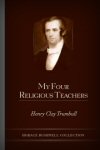
Read about how the tremendous influence of Horace Bushnell impacted and shaped another influential figure in American Protestantism, Henry Clay Tumbull. Trumbull was the Lyman Beecher Lecturer at Yale Divinity School and a pioneer of the Sunday school movement in America. Along with such notable figures as Charles Finney, Trumbull writes about Bushnell as one of his most notable influences.
Henry Clay Trumbull (1830–1903) was educated at the Stonington Academy and Williston Seminary in Massachusetts and was ordained as a Congregational minister. He later served as a chaplain in the Union army during the Civil War before entering his life’s work in the Sunday school movement. He served as chair of the Fifth National Sunday School Convention (1872) and became editor of the Sunday School Times in 1875.